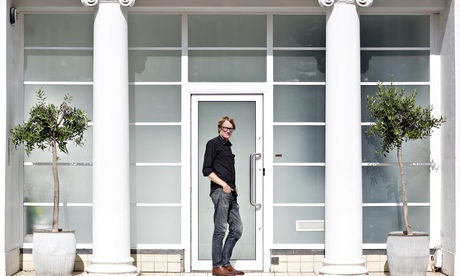Patrick deWitt likes to send his characters on quests: a contract killing in his picaresque gold-rush western The Sisters Brothers, shortlisted for the 2011 Man Booker prize and now adapted as a film; a coming-of-age ramble around a folkloric 19th-century Europe in 2015’s Undermajordomo Minor. His fourth novel propels a pampered, dysfunctional mother-and-son duo from New York to Paris, there to burn through the dregs of their considerable fortune.
“My plan was to die before the money ran out,” says 65-year-old Frances, whose beauty and eccentricity have enthralled Manhattan for decades – most notably when she found her husband dead in bed and went skiing rather than calling an ambulance. “But I kept and keep not dying, and here I am.” A friend has a vacant Paris apartment; so off she goes by cruise liner with her son Malcolm, a “lugubrious toddler of a man” whom she neglected as a child and now stifles as an adult, plus a bag stuffed with her last €170,000 and a recalcitrant cat called Small Frank.
French Exit unfolds in a putative present with the nostalgic patina of a Wes Anderson film: a world of highballs and oddballs, raised eyebrows and flat affect. From its arch first line – “All good things must end” – it is sinuously enjoyable: DeWitt writes in a gorgeously relaxed, freeform style, dabbing a clause here, a phrase there. The book is studded with tiny pleasures (a lizard “performing important push-ups”) and urbane aphorisms (“Frances had come to think of gift-giving as a polite form of witchcraft”), as well as dialogue to relish. When Malcolm asks if Frances ever loved his father, a villainous lawyer who dedicated his life to “defending the indefensible”, she neatly wraps up their life together in a dozen words: “‘I did, then I didn’t, then I did, then I really didn’t.”
From the western to the fairytale, DeWitt has found liberation within the conventions of genre - an overlooked space where he can keep on surprising the reader, triangulating wit, absurdism and existential angst. This book is billed as “a comedy/tragedy of manners”, and though many elements are taken from farce – a postcard mailed by accident, slaps and slapstick, indoor bicycling – sadness mists the pages and death is in the air along with the aroma of croissants. Gradually, we discover the founding traumas behind Frances and Malcolm’s flip nihilism, the terrible consequences of the lack of love. “Thank you for killing her,” says 15-year-old Frances to the statue of Christ on the cross, when she enters a church for the first time for the funeral of her pathologically unaffectionate mother. As a boy, Malcolm was just “‘a lump of heartbroken clay”. He was outsourced by his parents to school, tutors and his own meagre devices, and decades of curdled anger now make connecting with his devoted, frustrated fiancee, Susan, almost impossible. And if trauma arrests your development, so, in a way, does money. A life cushioned by wealth has given free rein to Frances’s every impulse. Her latest whim is to flush €100 notes down the toilet: can she survive her own insouciance? What happens when the money runs out?
“Everyone needs friends,” Frances is told by Mme Reynard, another American abroad and the latest to be drawn to her chilly charisma. “No, that’s actually not true,” she replies. But Frances and Malcolm’s journey will, of course, be emotional as well as geographical. As the book progresses, DeWitt inserts new characters into the double act of the mother-son dynamic with increasing abandon: as well as a medium who can see the approach of death, within the space of a paragraph we get an eccentric doctor, an eccentric wine merchant and an eccentric private detective. The novel, which has been so sharp and strange, threatens to descend into sentimentality as they all come together to drink heavily and bare their souls: Frances even does the washing up.
That it saves itself from schmaltz is in no small part due to the character of Small Frank, who joins the pantheon of extraordinary literary felines alongside Bulgakov’s Behemoth and Saki’s Tobermory. At once a typical cat and something rather more, he keeps the novel darting through the alleys of the absurd even as Frances and her newfound gang try to enlist him in their quest for emotional resolution.
French Exit trades in surfaces rather than depths, but DeWitt’s particular comic genius is to evoke the darkness behind the dazzle. The novel is a brittle, unsettling delight: a fairground ride swooping above vertiginous drops, wringing out laughter and screams as it rattles towards its conclusion. Whichever style he adopts or genre he inhabits, DeWitt remains a true original.
• French Exit is published by Bloomsbury. To order a copy for £12.49 (RRP £16.99) go to guardianbookshop.com or call 0330 333 6846. Free UK p&p over £10, online orders only. Phone orders min p&p of £1.99.










